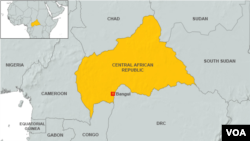Armed Christian militia members roamed the streets and protesters erected barricades on Sunday in the capital of Central African Republic, where deadly inter-religious clashes erupted a day earlier, witnesses said.
At least 21 people were killed and another 100 were wounded on Saturday when Muslims attacked a mainly Christian neighborhood in Bangui in reprisal for the murder of a Muslim man.
The clashes were the worst this year in the city, where U.N. peacekeepers and French troops are meant to ensure security. The government blamed them on individuals seeking to derail elections planned for next month.
Peacekeeping mission
Angry young men used tree trunks to block Bangui's main arteries early on Sunday. Soldiers from the U.N. peacekeeping mission, MINUSCA, fired tear gas at crowds on Avenue Boganda in an unsuccessful attempt to clear the road.
Witnesses reported hearing sporadic gunfire in parts of the city and saw homes and shops being looted. But there were no immediate confirmed reports of further deaths on Sunday.
"Enough is enough. We want (President Catherine) Samba-Panza to go. Since she's been there the Muslims kill with impunity. She's doing nothing to disarm them," said one protester who declined to give his name.
Thousands of Central Africans have died and hundreds of thousands remain displaced after two years of violence that erupted after mainly Muslim Seleka rebels seized power in the majority Christian country in 2013.
Seleka abuses sparked reprisals by Christian "anti-balaka" militias that drove most Muslims from the south in a de facto partition of the country.
Allegations
Protesters alleged U.N. and French forces did little to intervene in Saturday's violence and called for the sidelined Central African army, the FACA, to assume responsibility for security.
"We are calling for a civil disobedience movement starting now and we demand the immediate redeployment, without conditions, of the FACA," civil society leader Gervais Lakossa told Reuters.
Anti-balaka fighters armed with assault rifles and machetes were seen on Bangui's streets on Sunday as many city residents fled their homes for protected displacement camps.
"The government asks the population not to cede to the manipulation of extremists who are seeking to set the country on fire to satisfy their selfish political ambitions," Security Minister Dominique Said Paguindji said on state radio.
Voters are due to elect a new president and parliament on Oct. 18 to replace an interim government led by Samba-Panza. Despite lagging preparations and the renewed violence in the capital, Paguindji said the polls would go ahead as scheduled.




